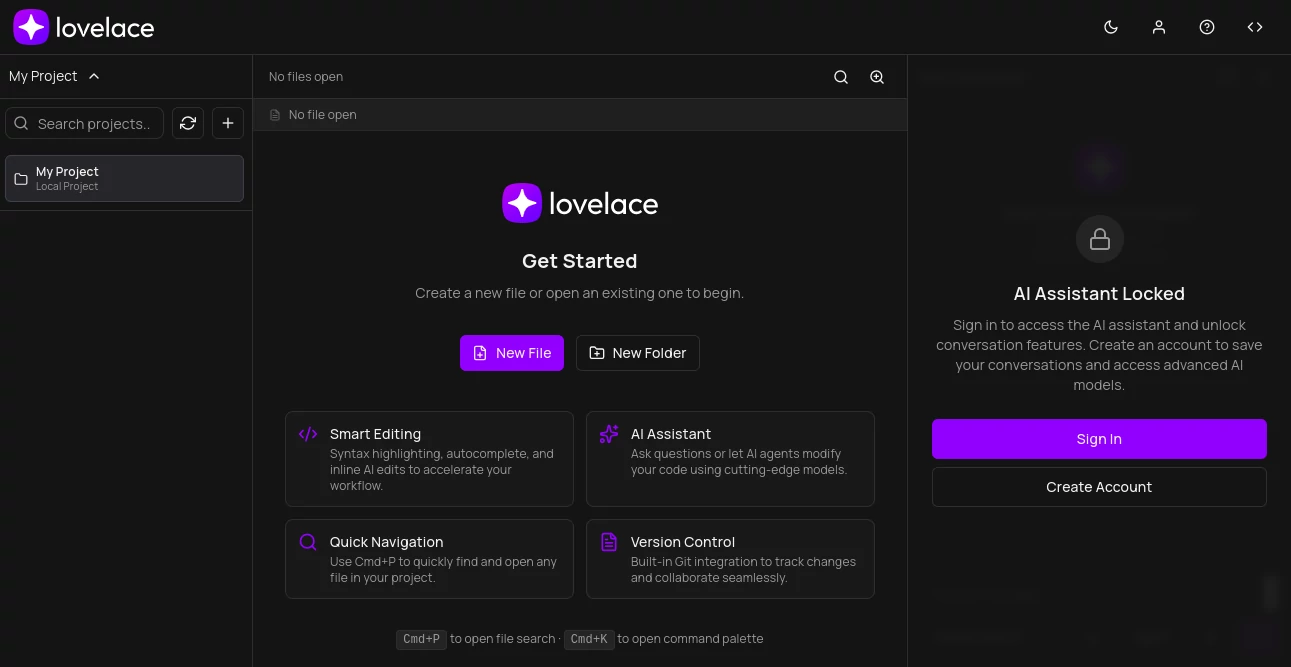🧠 AI Quiz
Think you really understand Artificial Intelligence?
Test yourself and see how well you know the world of AI.
Answer AI-related questions, compete with other users, and prove that
you’re among the best when it comes to AI knowledge.
Reach the top of our leaderboard.
Lovelace
Code Smarter in a Developer-First IDE

What is Lovelace?
Lovelace delivers a clean, powerful space where coders drop distractions and dive straight into building. This web-based editor packs the punch of desktop tools into your browser, letting teams and solo devs ship faster with smart assists that feel like a second brain. Veterans who switched swear it shaved hours off debug hunts and turned tangled repos into tidy masterpieces.
Introduction
Lovelace launched quietly last year from a small crew tired of bloated editors that hog resources and hide features behind endless menus. Word spread in dev circles when early users posted screenshots of lightning-fast refactors on massive codebases. It’s now the daily driver for thousands, from indie hackers prototyping MVPs to enterprise squads wrangling microservices. What hooks people is the “just works” vibe—open a project, type, and watch the heavy lifting happen without a single config wrestle.
Key Features
User Interface
The moment you land, a dark canvas with crisp Monaco fonts greets you, sidebar collapsing with one tap to gift full-screen real estate. Files tree hug the left, terminal slides up from the bottom, and a tiny status bar whispers git health without shouting. Keyboard warriors fly with Vim bindings baked in, while mouse lovers drag-drop folders like desktop natives. Nothing flashes or begs for attention; every pixel earns its keep.
Accuracy & Performance
Jump-to-definition nails the exact line across monorepos, even when symbols share names. Refactors rename in milliseconds, never leaving phantom references behind. On a modest laptop, 100k-line projects stay buttery, with zero stutter during live previews. Testers report catching edge-case bugs in half the usual time, thanks to inline hints that surface type mismatches before you run.
Capabilities
Spin up containers for any language with one click, hot-reload Node or Python apps, and debug remotely over SSH without leaving the tab. Built-in Git UI stages hunks visually, crafts commits with AI summaries, and pushes with a keystroke. Pair-program by sharing a live link—cursors dance in sync, no installs required. Extensions marketplace already hosts 200+ snippets, from Terraform validators to React component generators.
Security & Privacy
Projects live encrypted at rest; nothing touches disk unscrambled. Share links expire or password-lock, and audit logs track every external peek. Enterprise plans add SSO and on-prem mirrors, keeping secrets inside your firewall. Free-tier users still get end-to-end TLS, so side-project ideas never leak.
Use Cases
Bootstrappers prototype full-stack apps in a single afternoon, shipping to Vercel with one command. Remote agencies onboard juniors by forking a sandbox repo where mistakes cost nothing. Open-source maintainers triage PRs with live diff previews, merging clean code before coffee cools. Even data scientists spin Jupyter-style notebooks beside backend services, watching models train in the same window.
Pros and Cons
Pros:
- Zero-setup workspace—open browser, code, done.
- Blazing autocomplete that actually understands your stack.
- Real-time pair coding that beats any dedicated tool.
- Free tier generous enough for serious side hustles.
Cons:
- Offline mode still in beta, needs internet for full power.
- Heavy GPU tasks lean on your local machine, not cloud.
- Extension vetting is community-driven, check reviews.
Pricing Plans
Solo devs ride free forever—unlimited private repos, 3 concurrent sessions. Teams jump to fifteen bucks per seat for unlimited pair sessions and priority containers. Studios go enterprise with custom SLA and private cloud at coffee-money per dev. Seven-day pro trial hands you the full toy box, no card asked.
How to Use Lovelace
Hit the big “Start Coding” button, OAuth with GitHub or GitLab, and pick a repo or start blank. Cmd+K opens the command palette—type “terminal” or “debug” to summon panels. Ctrl+Shift+P refactors, F8 steps through breakpoints. Invite a teammate by copying the share link from the top bar. When ready, hit the rocket icon to deploy straight to your host.
Comparison with Similar Tools
Against local giants, Lovelace skips the 2-GB download and runs anywhere. Versus pure cloud editors, it adds first-class debugging and containers without upselling. It lands right in the goldilocks zone—rich enough for pros, gentle enough for weekend warriors.
Conclusion
Lovelace proves you don’t need a monster rig to move fast. It hands developers superpowers in a browser tab, leveling the field so great code ships from dorm rooms and beach cafés alike. As remote work sticks around, this IDE keeps evolving into the one window every coder leaves open all day.
Frequently Asked Questions (FAQ)
Do I need to install anything?
Nope—just a modern browser and a pulse.
Can I use my own domain for previews?
Team plans let you tunnel to custom URLs.
Is my code backed up?
Hourly snapshots plus git sync keep you safe.
What languages shine brightest?
JS/TS, Python, Go, Rust—everything else works too.
Can I self-host Lovelace?
Enterprise license includes Docker images for air-gapped bliss.
AI No-Code & Low-Code , AI Code Assistant , AI Code Generator , AI Developer Tools .
These classifications represent its core capabilities and areas of application. For related tools, explore the linked categories above.
Lovelace details
This tool is no longer available on submitaitools.org; find alternatives on Alternative to Lovelace.
Pricing
- Free
Apps
- Web Tools

















